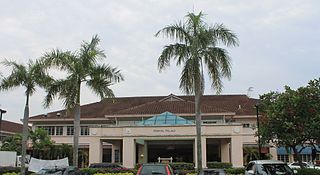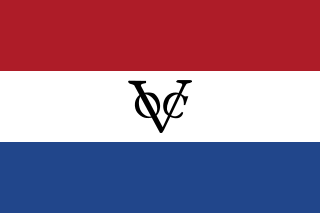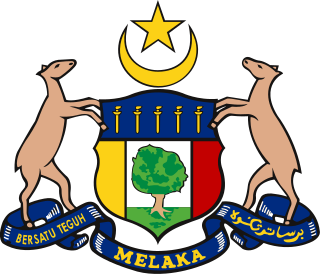Related Research Articles

The Strait of Malacca is a narrow stretch of water, 800 kilometres (500 mi) long and from 65 to 250 km wide, between the Malay Peninsula to the northeast and the Indonesian island of Sumatra to the southwest, connecting the Andaman Sea and the South China Sea. As the main shipping channel between the Indian and Pacific oceans, it is one of the most important shipping lanes in the world.

The Malacca Sultanate was a Malay sultanate based in the modern-day state of Malacca, Malaysia. Conventional historical thesis marks c. 1400 as the founding year of the sultanate by King of Singapura, Parameswara, also known as Iskandar Shah, although earlier dates for its founding have been proposed. At the height of the sultanate's power in the 15th century, its capital grew into one of the most important transshipment ports of its time, with territory covering much of the Malay Peninsula, the Riau Islands and a significant portion of the northern coast of Sumatra in present-day Indonesia.

Malacca City is the capital city of the Malaysian state of Malacca, in Melaka Tengah District. It is the oldest Malaysian city on the Straits of Malacca, having become a successful entrepôt in the era of the Malacca Sultanate. The present-day city was founded by Parameswara, a Sumatran prince who escaped to the Malay Peninsula when Srivijaya fell to the Majapahit. Following the establishment of the Malacca Sultanate, the city drew the attention of traders from the Middle East, South Asia, and East Asia, as well as the Portuguese, who intended to dominate the trade route in Asia. After Malacca was conquered by Portugal, the city became an area of conflict when the sultanates of Aceh and Johor attempted to take control from the Portuguese.

A Famosa was a Portuguese fortress built in Malacca, Malaysia, circa 1512. The oldest part of the fortress was a five-storey keep which eventually gave its name to the fortress as a whole. Some time following the Battle of Malacca (1641) and the occupation of the city by the Dutch, the keep was destroyed but the outer walls of the fortress were expanded. However, in 1811 the British destroyed all of the original fortress and most of the outer walls. The Porta de Santiago gateway, and the rebuilt Middelburg Bastion, are the only parts of the fortress that remain today.

Piracy in the Strait of Malacca has long been a threat to ship owners and the mariners who ply the 900 km-long sea lane. In recent years, coordinated patrols by Indonesia, Malaysia, Thailand, and Singapore along with increased security on vessels have sparked a sharp downturn in piracy.

Malacca General Hospital is a government-funded district general hospital in Malacca City, Center Malacca, Malacca, Malaysia. A secondary and specialist hospital, it serves as a referral centre for patients from primary and health centres in the state as well as the northern part of Johor and the Tampin district of Negeri Sembilan.

Dutch Malacca (1641–1825) was the longest period that Malacca was under foreign control. The Dutch ruled for almost 183 years with intermittent British occupation during the French Revolutionary and later the Napoleonic Wars (1795–1815). This era saw relative peace with little serious interruption from the Malay sultanates due to the understanding forged between the Dutch and the Sultanate of Johor in 1606. This period also marked the decline of Malacca's importance. The Dutch preferred Batavia as their economic and administrative centre in the region and their hold in Malacca was to prevent the loss of the city to other European powers and, subsequently, the competition that would come with it. Thus, in the 17th century, with Malacca ceasing to be an important port, the Johor Sultanate became the dominant local power in the region due to the opening of its ports and the alliance with the Dutch.

Portuguese control of Malacca –a city on the Malay Peninsula– spanned a 130 year period from 1511 to 1641 as a possession of the Portuguese East Indies. It was captured from the Malacca Sultanate as part of Portuguese attempts to gain control of trade in the region. Although multiple attempts to conquer it were repulsed, the city was eventually lost to an alliance of Dutch and regional forces, thus beginning a period of Dutch rule.

The Stadthuys is a historical structure situated in the heart of Malacca City, the administrative capital of the state of Malacca, Malaysia, in a place known as the Red Square. The Stadthuys is known for its red exterior and nearby red clocktower. It was built by the Dutch in 1650 as the office of the Dutch governor and deputy governor. It continued to be used as the Treasury, Post Office, Government Offices, and suites of apartments for the high officials after the takeover by the British.

Christ Church, Malacca, is an 18th-century Dutch-built Anglican church in the city of Malacca City, Malaysia. It is the oldest functioning Protestant church in Malaysia and is within the jurisdiction of the Lower Central Archdeaconry of the Anglican Diocese of West Malaysia.

The Malacca State Legislative Assembly is the unicameral legislature of the Malaysian state of Malacca. It is composed of 28 members who are elected from single-member constituencies throughout the state. Elections are held no more than five years apart, along with elections to the federal parliament and other state assemblies.

Malacca, officially the Historic State of Malacca, is a state in Malaysia located in the southern region of the Malay Peninsula, facing the Strait of Malacca. The state is bordered by Negeri Sembilan to the north and west and Johor to the south. The exclave of Tanjung Tuan also borders Negeri Sembilan to the north. Its capital is Malacca City, which has been listed as a UNESCO World Heritage Site since 7 July 2008.

The Malaysia Youth Museum is a museum in Malacca City, Malacca, Malaysia, which dedicated to the youth of Malaysia and their contribution to the economic and social wellbeing at regional, national, and international levels.

Jalan Syed Abdullah Aziz or Malacca Coastal Highway, Federal Route 192, is a coastal highway in Malacca City, Malacca, Malaysia. This coastal highway was built as a bypass of the Malacca City Centre and was built to shorten the travel distance between Bandar Hilir and Kampung Limbongan town area from 10 km (estimated) to 5 km (estimated).

The Middelburg Bastion was one of nine bastions of A Famosa, in Malacca City, Malacca, Malaysia located at the mouth of Malacca River. The bastion has been restored, together with cannons, and is open for visitors. The Dutch name is in reference to the city of Middelburg, Zeeland.
Elections in Malacca have been held in the Malaysian state of Malacca since 1955 and have chosen Malacca's elected representatives in the Dewan Rakyat and Dewan Undangan Negeri.

Melaka United Football Club was a Malaysian professional football club based in Malacca that competed in the Malaysia Super League. They were owned by Kenteam Sdn Bhd, which is one of main nitrile glove producers in Malaysia. The club's home ground has been the Hang Tuah Stadium, before moving to Hang Jebat Stadium in Paya Rumput, Krubong in 2005. The club represented the state of Malacca in Malaysian football competitions. They reached the top division in Malaysian football after back-to-back promotions as champion of the 2015 Malaysia FAM League and 2016 Malaysia Premier League.
References
- ↑ "Membangunkan pertanian bandar". Archived from the original on 25 November 2017.